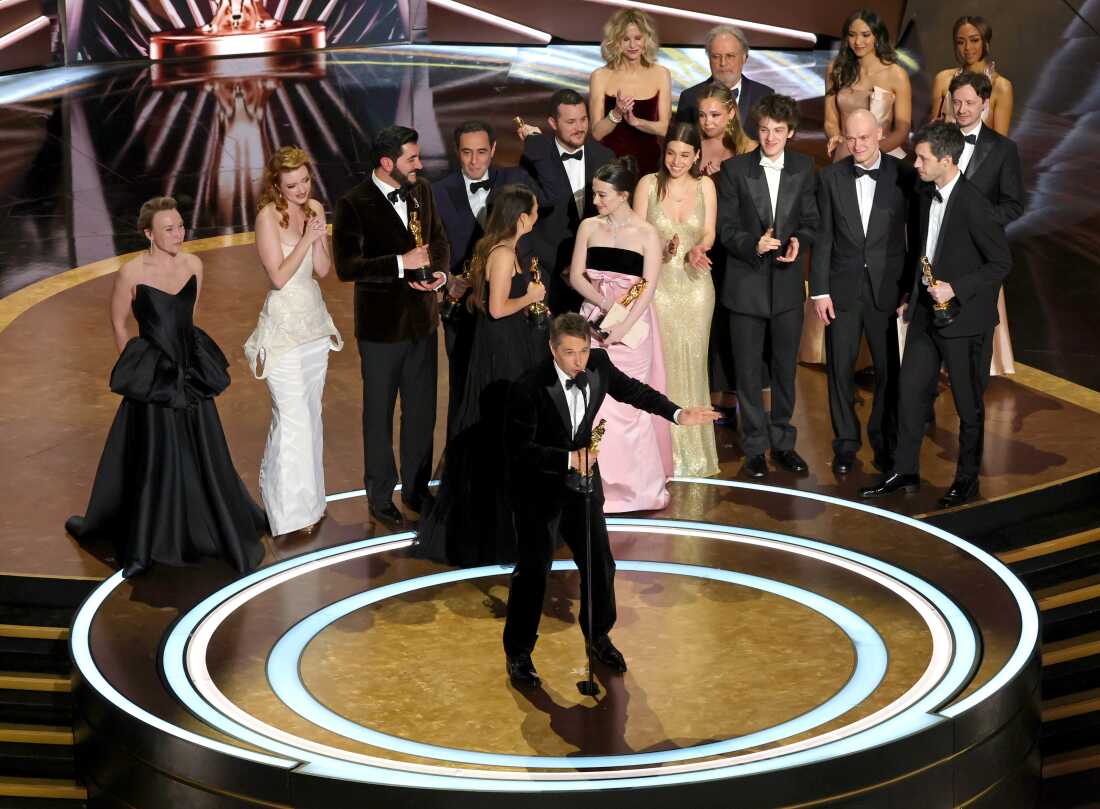Sean Baker's Battle Cry: A Plea To Revive Cinema Culture
This past Sunday at the 2025 Oscars, a low-budget, independently made film took home five Academy Awards. Written and directed by Sean Baker this film won Best Picture, Best Lead Actress, and three others, undeniably consecrating its widespread success.

This past Sunday at the 2025 Oscars, a low-budget, independently made film took home five Academy Awards. Anora (2024), written and directed by Sean Baker, won Best Picture, Best Lead Actress, and three others, undeniably consecrating its widespread success. The film, starring Once Upon a Time in Hollywood (2019)’s Mikey Madison and other lesser-known Russian actors, follows Ani (Mikey Madison), whose endearing Brooklyn charm gets her entangled with a callow, Russian nepo-baby, and the movie follows the rise and inevitable fall of their whirlwind romance. Ani is unable to conform to the bourgeois expectations of Ivan's family, as they refuse to see her as anything other than a sex worker. While the sheer amount of awards Anora took home is astounding, it was one of the lowest-grossing best picture winners, and ever since its outstanding reception at the Cannes Film Festival, it is no surprise that the film's creativity was honored at the past weekend's award show. Rather than basking in the multiple accolades, director Baker used his time on stage to remind us of something within the film industry that we risk losing, and how we must fight to keep it.
What is uniquely interesting about the Oscars and the Academy Awards is that it is oftentimes not solely about the movie itself. While specific nominations like Emilia Perez (2024) can misrepresent this notion, the films up for awards must, naturally, be superb, but to actually win awards, they have to do more than just be good. Studios campaign their films, just like in an election, and will spend millions of dollars to make sure that Academy members recognize their film as outstanding and culturally impactful, regardless of a movie’s box office performance.
This concept, one that feels almost antithetical to the art form that is film, controls and guides the results of the Oscars, and Anora was no stranger to such campaigning. Released in October of 2024, Anora’s theatrical rollout of exclusive, limited showtimes and its refusal to be available on subscription-based services only heightened its appeal. Interested patrons were forced to actually go outside, leaving the comfort of their beds and couches to purchase a ticket and enjoy the movie as an experience, rather than as passive watchers.
In his acceptance speech for Best Director, Sean Baker used his time on stage as an opportunity to highlight this fundamental issue, one that has plagued modern film culture, particularly since the COVID-19 pandemic. “Watching a film in the theatre, with an audience, is an experience. We can laugh together, cry together, scream in fright together, perhaps sit in devastated silence together… It's a communal experience you simply don't get at home." Baker was speaking for all of us last Sunday when he said "This is my battle cry. Filmmakers, keep making films for the big screen."

He revealed to us the subconscious awareness we all have that without the help of a cinema, films lose some of their force. Baker appealed to the disappointment audiences feel each time they rent a movie on Prime and spend half of the film scrolling on their phone. He made clear the reason why the emotional kick of a devastating climax no longer incites tears or any feelings at all. The film industry is constantly changing and evolving, and by proxy, so are we as consumers. Baker begs that not all things must change and that not all change is beneficial. It isn't just Baker's speech that represents this important perspective but the film Anora itself. Made with a small budget of around 6 million dollars and without the support provided by a major studio, Anora’s Oscars success rebukes the formulaic, corporate tendencies of Hollywood’s “studio” legacy. Baker showcases how it is the work of those with few resources who continue to produce the most innovative and creative works.
Baker, throughout his career, pioneered a space for ingenious, independent filmmaking. His films Tangerine (2015), Starlet (2012), and The Florida Project (2017) all highlight underrepresented communities and experiences, and he manifests these realities with creative methods, his films Tangerine and Starlet both being shot entirely with iPhones. While Anora used more traditional filmmaking techniques, its subject matter did not deviate from Baker’s commitment to displaying stigmatized communities. Ani’s identity as a stripper is masterfully portrayed, and in Anora, Baker showcases the strong sense of community and sisterhood that exists within the sex industry. He also does not shy away from showing its realities.
There seems to be an even larger problem that Baker reveals in his speech, even if it's not the one he meant to. Our ever-growing dependency on streaming services has not just impacted the industry itself but the place that film has in our culture. Even as early as the 20th century, when film was only a newborn industry, dominated by Europe and Russia and developing rapidly due to technology, film was more than just a niche interest. It was a movement, one that didn't appeal to certain groups or ages, but that appealed to everyone, and inexplicably became a part of life. While certainly some took to it more than others, in the 20th century, when the only stimuli one had access to was the company of those around them or perhaps a book, the theatre and cinema became a culturally significant ritual. While it served as a pastime, film enriched us with something we didn't know we needed, and for the first time, people were able to see with their own eyes portrayals that represented and replicated a multitude of existences. Certain aspects of humanity never seen before were painted in technicolor, harsh realities that someone may not understand elucidated on the screen, and consequentially, film began to shape our lives in return. For the most part, there was no “film culture,” no “cinephile,” not when film became a part of us. Only as film continued to progress did it develop its own genre-related niches.
What was so special about going to the theatre, or even picking up a DVD from Blockbuster, is that while film is such a large part of our lives, it is almost always as a consumer. It is only an incredibly minuscule number of people who get to go on and actually make, cast, edit, or star in movies. There is always a distance, one that sits between the film and the viewer, and while streaming services seem to bridge that gap, creating a path so that more and more people have access to motion pictures, in a way, these services only widen it.
When you go out of your way to access the pleasures of film, you aren't just consuming it but giving it a small part of your life. When you simply click a button and turn a movie on, it becomes mundane and ordinary. Suddenly, that beautiful, symbiotic relationship that existed between the medium and the viewer has disappeared.
Sitting in the theatre, watching a movie, whether it be a good one or a bad one, makes you a part of something. You can be alone or with friends and family, but regardless, you are surrounded by people, by strangers, and for a period of time, you exist in another world that you share with them. All evidence of a life outside of the theatre disappears the second the movie begins, and you are offered a respite from whatever hardships you face outside the doors. When you watch a movie on your couch, or maybe on your bed, you crack a window open, filtering in the sounds of the outside world, or you might get a phone call, and since Nicole Kidman hasn't told you to silence your notifications, you may pick up that call. Outside of the cinema, you are at the mercy of your surroundings. There is no escaping reality, no alternative world to become a part of, and as such, the film maintains its distance. We may have more access to it, but this access dilutes its importance, dulling its potential impact.
Anora unveils to us a world of which most viewers live in ignorance. Baker gives us only a brief snapshot of Ani’s life, but by showing it to us in the manner in which he does, it is not as though we are seeing her life but living it ourselves. When we sit in a theatre and watch as Ani is swept up by Ivan’s money, his parties, and his jet, were also entranced by it, even though it's a circumstance we’ll most likely never find ourselves in. By emphasizing the importance of movie theatres not just for the film industry but for our culture in general, forcing viewers to delight in Anora in the cinema, Baker is doing his part in ensuring that theatre culture does not die. The worlds and realities he depicts can only be properly appreciated and understood in the theatre, and so he simultaneously refuses to let these voices and realities go unheard.

After the pandemic, my local AMC theatre shut down. Maintenance on the building cost more money than they were making, and no one seemed interested in going to the movies anymore. That AMC theatre wasn't just a place where I watched movies. That theatre had become a part of my life, of my childhood, its reclining chairs comfier than any other, with a location I could get to easily by train, where Studio Ghibli re-runs were held every single week. From then on, my movie-watching dwindled as I became increasingly uninspired by the bland home page of Amazon Prime or the options given to me by Hulu or Netflix. You may not realize it, not when you absentmindedly sit through Good Will Hunting (1997) or The Boy and The Heron (2023), but movies are not just a part of our lives; they mark them and also represent them.
Baker proclaimed his speech as a battle cry,” and while this may seem dramatic, it is a cry that is necessary. If we let this integral part of our society die out, then we will forever lose the potential that movies present to us. I was lucky enough to witness Anora in theatres, and it's obvious to me that a computer screen, even a megalithic 8K UHD, could never do it justice. While campaigning a movie for an award may seem inauthentic, Anora’s campaign was not just a campaign for a film but a campaign to revive the passion we once had for film itself. Anora’s Oscars blow out only further cements this, and it is as Baker says, that “If we don't reverse this trend, we will be losing a vital part of our culture.”
The Art Newsletter
Creativity. Culture. Community.
Every Thursday, we send a carefully curated drop of stories, tools, and creative insight for the next generation of artists, musicians, filmmakers, designers, and thinkers.
From cultural commentary to personal reflections, viral trends to overlooked gems. We cover what’s happening and what matters. Want local updates too? Join our Austin list for events, meetups, and opportunities.





